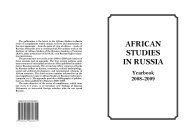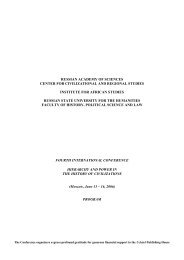L. Fituni, I. Abramova Resource Potential of Africa and Russia's ...
L. Fituni, I. Abramova Resource Potential of Africa and Russia's ...
L. Fituni, I. Abramova Resource Potential of Africa and Russia's ...
Create successful ePaper yourself
Turn your PDF publications into a flip-book with our unique Google optimized e-Paper software.
establishment <strong>of</strong> sovereignty over their natural resources, for the<br />
right to independently develop <strong>and</strong> utilize them in their own interests<br />
is becoming ever more resolute <strong>and</strong> effective. It is waged in<br />
various forms <strong>and</strong> at various levels: national, regional <strong>and</strong> international.<br />
This struggle is facilitated by the changes in the character <strong>of</strong> external<br />
economic relations <strong>of</strong> the developing countries caused by the<br />
collapse <strong>of</strong> the world colonial system <strong>and</strong> the establishment <strong>of</strong> economic<br />
relations various countries <strong>of</strong> the multipolar world. These<br />
processes were accelerated recently by the hardest global economic<br />
crisis since the Great Depression <strong>of</strong> 1930s. The crisis significantly<br />
reduced the financial basis for prospecting <strong>and</strong> investment in <strong>Africa</strong>n<br />
<strong>and</strong> Russian mining. On the other h<strong>and</strong> the global dem<strong>and</strong> for<br />
many types <strong>of</strong> mineral resources remained relatively high due to two<br />
factors: emergence <strong>of</strong> new consumers (primarily China, India, Brazil<br />
<strong>and</strong> other) <strong>and</strong> continued search for safer investment by the operators<br />
on financial markets.<br />
During the crisis, the emerging big economies, first <strong>of</strong> all<br />
China turned into locomotives <strong>of</strong> foreign investment into <strong>Africa</strong>n<br />
<strong>and</strong> Russian extractive industries. After the most acute phase <strong>of</strong> the<br />
crisis was over the old transnational mining corporations gradually<br />
resumed investing in some areas (<strong>of</strong>f-shore oil <strong>and</strong> gas production,<br />
rare metals etc). The other major sources <strong>of</strong> exploration financing<br />
in <strong>Africa</strong> are governments, multi-lateral agencies (such as UNDP<br />
<strong>and</strong> EEC), bilateral agencies (based in France, UK, Germany <strong>and</strong><br />
Sweden).<br />
The government sector in most <strong>Africa</strong>n countries is poorlyequipped<br />
both technically <strong>and</strong> financially to carry out effective exploration,<br />
<strong>and</strong> prospectors <strong>and</strong> small-workers have limited capabilities.<br />
Only in a h<strong>and</strong>ful <strong>of</strong> instances (for example Burkina Faso, Burundi,<br />
Ethiopia <strong>and</strong> Mali) has multi-national <strong>and</strong> bilateral assistance<br />
been effective in finding important new reserves or ore bodies. To<br />
achieve a significant upturn in exploration, the region will need to<br />
encourage private investment from major international mining companies,<br />
a growing group <strong>of</strong> technically competent "juniors", venture<br />
capitalists, <strong>and</strong> joint-ventures between these groups. 35<br />
92







